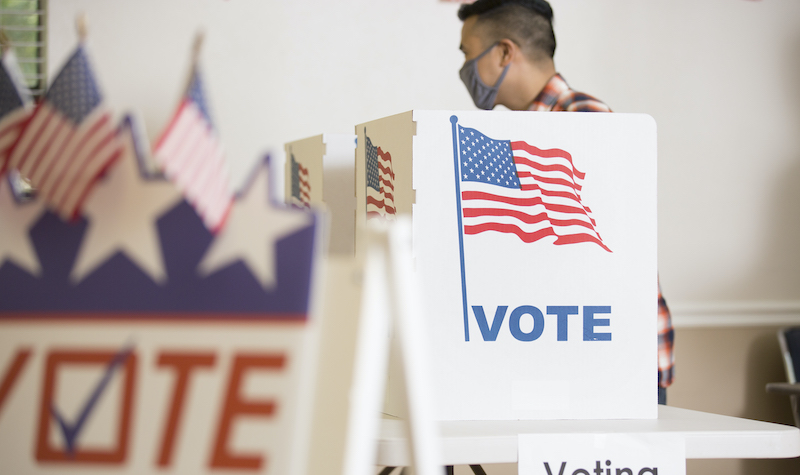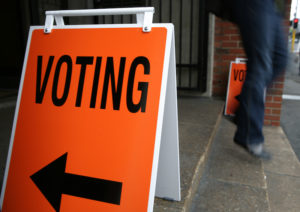
Scholars advocate the creation of a new independent agency to oversee all federal election administration.
Who regulates federal elections? The answer is complicated. At the federal level, election administration is managed by a total of 17 federal departments and agencies, governed by nine different federal laws, and overseen by more than 22 distinct congressional committees.
The United States needs a single, centralized, independent agency to streamline the administration of federal elections, election scholars Lee Drutman and Charlotte Hill argue in a recent paper.
They favor the creation of a new federal election agency that would assume the responsibilities of the two current federal agencies with primary responsibility for regulating federal elections: the Federal Election Commission (FEC) and the Election Assistance Commission (EAC). Drutman and Hill explain how gridlock has plagued both of these agencies in recent years, exposing the shortcomings of the current regulatory structure.
The FEC is responsible for administering and enforcing campaign finance law. But during most of the 2020 election year, three of the six FEC commissioner seats remained empty—leaving the agency unable to reach a quorum. Without a quorum, the FEC cannot hold meetings, engage in any rulemaking, vote on enforcement matters, or issue advisory opinions. When this occurs, the FEC is powerless to enforce the law.
The EAC oversees election administration matters. Formed in 2002, Congress intended the EAC to be a one-stop-shop for all matters related to election administration, including the responsibility to update voting equipment, conduct studies on elections, and administer grant funds to individual states.
But like the FEC, the EAC’s power has been weakened by empty commission seats, reduced staff, and budget cuts. Congress appropriated $13.4 million in fiscal year 2010 for general operating support for the agency. By 2019, this figure declined to just shy of $8 million. Furthermore, Congress has not delegated to the EAC any authority to enforce or implement its own recommendations.
Drutman and Hill argue that the creation of a new federal election agency would mitigate these problems. They propose choosing five independent commissioners to lead the new agency, with a requirement that each commissioner be unaffiliated with any political party over the last five years. This would mitigate the politicization of the FEC and EAC commissioner selection processes.
The scholars also propose a more robust enforcement process that sets penalties for non-compliance with regulations. They envision the agency as having an enforcement division that would serve as an outside auditor for state and local elections. Drutman and Hill also suggest that the agency should build out a robust “election forensics” team to search preemptively for fraud and ensure that congressional redistricting is equitable.
In addition to a division dedicated to enforcement, Drutman and Hill propose two additional divisions: a rulemaking division and a recommendation division.
The rulemaking division would be responsible for making rules and analyzing how proposed rules would affect voter participation among different populations. The recommendations division would issue recommendations for improvement after every presidential election so that election administration can keep pace with changing electoral needs.
The impact of the new agency on state election oversight would vary depending on the level of infrastructure each state currently has in place. States with “outdated” or “overly cumbersome voting laws” would be required to modernize their elections to meet certain minimal standards, while states such as Colorado and Oregon—with high levels of voter turnout—would largely be exempt from additional requirements.
To create a new agency, Congress would need to pass an enabling act. Such a law would define the scope of the agency’s power as well as how it would be funded. At this time, it is unclear whether the 117th Congress would be willing to make such a broad change to election administration.
In 2019, congressional Democrats tried to pass a comprehensive bill—known as H.R.1—that addresses many of the problems Drutman and Hill’s new agency would be designed to fix.
H.R.1 would overhaul the FEC by reducing the number of commissioners from six to five and ensuring that no more than two commissioners come from any single political party. The bill would also provide the Commission with a presidentially appointed chair to serve as its chief administrative officer.
Although the U.S. House of Representatives approved H.R. 1 in March 2019, Senate Majority Leader Mitch McConnell declined to bring the bill to the floor for a vote. The collapse of H.R.1 reveals the way partisanship may impede creation of this new agency.
Drutman and Hill acknowledge that, like other federal agencies, their proposed agency could be susceptible to partisan politics. They suggest that appointed commissioners should have a “long track record of nonpartisanship and expertise in election administration,” unlike the current commissioners—who are chosen in part based on their party affiliation. Drutman and Hill point to the Federal Reserve as a successful example of an agency that has mostly evaded partisan maneuvering.
They also admit that the new agency’s budget would probably need to be upwards of several billion dollars. They argue, however, that election administration is a worthy investment of the federal government. The United States currently spends approximately $8 per voter on election administration, while other democracies spend as much as $200 per voter.
U.S. elections are suffering from a “crisis of confidence,” Drutman and Hill argue. In advance of the 2020 general election, 46 percent of Americans were not confident the election would be conducted fairly and accurately. According to Drutman and Hill, the time for creating a new election agency is now.



